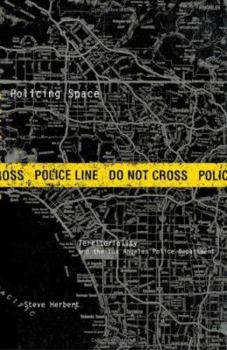Policing Space: Territoriality and the Los Angeles Police Department
Select Format
Select Condition 
Book Overview
Policing Space is a fascinating firsthand account of how the Los Angeles Police Department attempts to control its vast, heterogeneous territory. As such, the book offers a rare, ground-level look at the relationship between the control of space and the exercise of power.
Author Steve Herbert spent eight months observing one patrol division of the LAPD on the job. A compelling story in itself, his fieldwork with the officers in the Wilshire Division affords readers a close view of the complex factors at play in how the police define and control territory, how they make and mark space. A remarkable ethnography of a powerful police department, underscored throughout with telling on-the-scene vignettes, this book is also an unusually intensive analysis of the exercise of territorial power-and of territoriality as a key component of police power. Unique in its application of fieldwork and theory to this complex subject, it should prove valuable to readers in urban and political geography, urban and political sociology, and criminology, as well as those who wonder about the workings of the LAPD.Format:Paperback
Language:English
ISBN:0816628653
ISBN13:9780816628650
Release Date:November 1996
Publisher:University of Minnesota Press
Length:208 Pages
Weight:0.70 lbs.
Dimensions:0.5" x 6.0" x 9.0"
Customer Reviews
2 ratings
Fantastic!
Published by Thriftbooks.com User , 26 years ago
All I can say is that this is a wonderful book. I had to read it for his class (A fantastic professor as well) and it ended up being a pleasure to read. I couldn't put it down. It ia facinating and truthful look at the LAPD! I would recomend it to anyone who is interested in policing!
GREAT BOOK ABOUT SPACE AND HOW COPS PERCEIVE IT
Published by Thriftbooks.com User , 27 years ago
Herbert, Steve. (1997). Policing Space. Territoriality and the Los Angeles Police Department. Minneapolis: University of Minnesota Press. Here is a terrific book. I picked it up at Urban Center Books, started to read it on the subway home, and couldn't put it down. It is pretty rare that I feel this about any book in our field. Much of what I read seems an obligation rather than a chosen pleasure. So I am writing this e-mail "Sounding" to encourage others to get familiar with this book. This is a short, intense book, probably Steve Herbert's dissertation rewritten into this popular (but informing) version. It consists of a minimal amount of introductory material, an exposition of "six `normative orders' central to the structure of police organizations," and a brief coda titled "Making and Marking Space with the LAPD." The interesting thing is that each of the six normative orders" is elaborately played out in physical space. You can imagine where Herbert is coming from given that an early subheading is titled, "Weber, Foucault, and the Microgeopolitics of State Power." (13.) I'm not even going to attempt to summarize his theoretical position in this brief Sounding, but I will write out the following quotation (which I won't indent, because it would probably get screwed up in an e-mail): "Society, Culture, and Space" "Just as social-structural works often neglect the shaping influence of culture, they also regularly overlook the spatial embeddeness of social action...Analysis of everyday police behavior, in other words, must pay attention not only to its social and cultural construction, but also to its intractable spatiality; in working to uphold socially constructed notions of public order, officers seek to control the spaces they patrol." (20-21.) Well, isn't that something that you would want to read on about? It was so for me. The body of the book has six chapters, each describing and complexifying the six spatially expressed "normative orders." These are; [1] "...law, which by legislative fiat defines the permissible parameters of police action [rooted in, among other things, what space is public and what space is private]; [2] bureaucratic regulations, which seek to determine police procedures more finely through a set of rules that establish a chain of command [and which ascribe control of particular spaces to particular--sometimes competing--subdivisions of the bureaucracy]; [3] adventure/machismo, which constitutes the police as courageous individuals who embrace danger as a test of individual ability [and who choose to be or not be in particular places at particular times]; [4] safety, which establishes a set of practices to protect the police from undue harm [and which means that police are trained to walk close to buildings (so they may surprise whomever is inside), keep their cruiser windows rolled down (to be able to hear shots being fired) and their seat belts unfastened (to get out fast) in `dangerous





